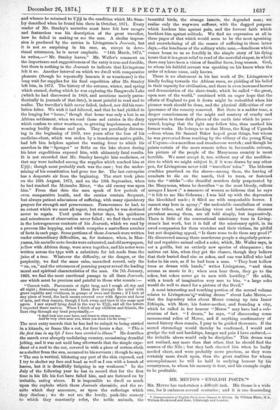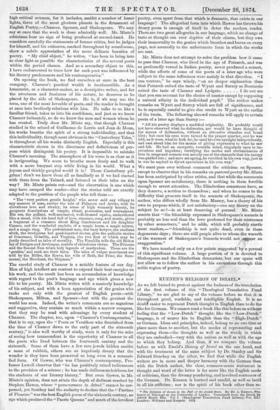MR. MINTO'S " ENGLLSH POETS."* Ma. MINTO has undertaken a
difficult task. His theme is a wide one, for it embraces several centuries ; and it is one demanding
• Characteristics of English Poets from Chaucer to Shirley. By William Mato, M.A. William Blackwood and Sons, Edinburgh and London.
high critical acumen, for it includes, amidst a number of lesser lights, three of the most glorious planets in the firmament of English Poetry,—Cbaucer, Spenser, and Shakespeare. We may say at once that the work is done admirably well. Mr. Minto's criticisms bear no sign of being produced at second-hand. He considers carefully the statements of former critics, but he judges for himself, and his estimates, marked throughout by sound sense, show a subtle appreciation of the more delicate beauties of poetry. " My chief object," he writes, "has been to bring into as clear light as possible the characteristics of the several poets within the period chosen. And as a secondary object to this, I have endeavoured to trace how far each poet was influenced by his literary predecessors and his contemporaries."
On opening the book, we find ourselves at once in the best company. Chaucer's poetical wealth is inexhaustible. As a humourist, as a character-maker, as a descriptive writer, and for the sweetness and freshness of his nature, he deserves to be placed by the side of Shakespeare. He is, if vi`e may use the term, one of the most loveable of poets, and the reader is brought at once into brotherly relations with him. He talks to us like a familiar friend, takes us into his confidence, and just as we know Chaucer intimately, so do we know the men and women whom he has created. Truly does Mr. Minto say, that though Chaucer studied in the school of Guillaume de Lorris and Jean de Meun, his works breathe the spirit of a strong individuality, and that this individuality, though most obvious in the "Canterbury Tales," is throughout all his works distinctly English. Especially is this characteristic shown in the directness and definiteness of pur- pose which distinguish his poetry. It is impossible to mistake Chaucer's meaning. The atmosphere of his verse is as clear as it is invigorating. We seem to breathe more freely and to walk with a more buoyant step while living in his world. What a joyous and thickly-peopled world it is ! Those Canterbury pil- grims ! don't we know them all as familiarly as if we had started with them from the Tabard, and listened to their tales on the way? Mr. Minto points out—and the observation is one which may have escaped the reader—that the stories told are exactly, adapted to the position of the people who tell them :—
" The ' very perfect gentle knight,' who never said any villany to any manner of man, recites the tale of Palamon and Arcite, with its chivalrous love and rivalry, its sense of high womanly beauty, its gorgeous descriptions of temple, ritual, procession, and tournament. His son, the gallant, well-mannered, well-dressed squire, embroidered like a mead, with his head full of love, romance, song, and music, gives a fragment of a romance about King Cambuscan and his daughter Canace, and the wonderful exploits of a magic horse, a magic mirror, and a magic ring. The professional men, the busy-lawyer, the studious clerk, the irreligious but good-hearted doctor, give the pathetic stories of Constance, Griselda, and Virginia, the two first of which may be justly described as tales of morality. The Franklin tells the old Briton lay of Dorigen and Arviragus, models of chivalrous virtue. The Prioress and the Second Nun relate holy legends of martyrdom. These are the 4 gentles,' and such are their tales. The tales of vulgar merriment are told by the Miller, the Reeve, the wife of Bath, the Friar, the Sum- moner, the Merchant, the Shipman."
The careful study of Chaucer is a notable feature of our day. Men of high intellect are content to expend their best energies on his work, and the result has been an accumulation of knowledge with regard to the poet's language and age which gives a new life to his poetry. Mr. Minto writes with a•masterly knowledge of his subject, and with a keen appreciation of the genius who ranks not only with the greatest of English poets—with Shakespeare, Milton, and Spenser—but with the greatest the world has seen. Indeed, the writer's comments are so sagacious and suggestive, they contain so much within a narrow compass, that they may be read with advantage by every student of Chaucer. The chapter, too, upon " Chaucer's Contemporaries," that is to say, upon the " Poets or Versifiers who flourished from the time of Chaucer down to the early part of the sixteenth century," is also well worthy of study, were it only for the sake of seeing how transcendent is the superiority of Chaucer to all the poets who lived between the fourteenth century and the sixteenth.- Some of them have a few rare jewels hidden amidst a mass of rubbish, others are so hopelessly dreary that the wonder is they have been preserved so long even in a mummi- fied form. Of Gower, who was Chaucer's contemporary, Pro- fessor Lowell observes that " he has positively raised tediousness to the precision of a science ; he has made dullness an heirloom for the students of our literary history." But even Gower, in Mr. Minto's opinion, does not attain the depth of dullness reached by Stephen Hawes, whose " perseverance in drivel " cannot be sur- passed, yet Southey had the audacity to declare that the," Pastime of Pleasure" was the best English poem of the sixteenth century, an age which produced the " Faerie Queene" and much of the loveliest poetry, even apart from that which is dramatic, that exists in our language ! The allegorical form into which Hawes has thrown his dreary poem is enough of itself to deter the modern reader. There are two great allegories in our language, which no change of taste or thought can ever deprive of their charm, but they owe their immortality to the genius which breathes and burns on every page, not assuredly to the unfortunate form in which the works are cast.
Mr. Minto does not attempt to solve the problem how it came to pass that Chaucer, who lived in the age of Petrarch, and was so profoundly versed in Italian poetry, never produced a sonnet, while the efforts of some of the poets of a later age who were subject to the same influences were mainly in that direction. "I can venture," he says wisely, " on no deeper explanation than that Petrarch suited the taste of Wyatt and Surrey as Boccaccio
suited the taste of Chaucer and Lydgate I do not see that you can account for the choice of master except by supposing a natural affinity in the individual pupil." The author makes remarks on Wyatt and Surrey which are full of significance, and he is especially careful to give due credit to Wyatt as the earlier of the twain. The following shrewd remarks will apply to certain poets of a later age than Surrey:— "AU his poetry displays a modified originality. He probably would not have observed what he delineates, nor would he have thought of the means of delineation, without an obtrusive stimulus and broad hint; but once his eyes were turned to the proper quarter, and he was told, as it were, what to look for, he used his own eyesight independently, and cast about him for the means of giving expression to what he saw and felt. He had an energetic, versatile mind, singularly open to im- pressions and impulses ; versifying the modes and circumstances of love in songs and sonnets was merely one of the channels that his energy was guided into ; and once set ageing, he versified in his own way, just as in war he aspired to direct operations in his own way." -
We must pass over without comment the criticism on Spenser, except to observe that in his remarks on pastoral poetry Mr. Minto has been anticipated by other critics, and that while the comments Upon Spenser are satisfactory, there is nothing in them forcible enough to arrest attention. The Elizabethan sonneteers have, as they deserve, a section to themselves ; and when he comes to the difficulty that presents itself in the sonnets of Shakespeare, the author, who differs wholly from Mr. Massey, has a theory of his own to propose which, if not satisfactory—can any theory on the subject be so ?—is at least deserving of perusal. Mr. Minto asserts that "the friendship expressed in Shakespeare's sonnets is probably no less real than the love professed for their mistresses by other sonneteers," and he adds, which will probably startle most readers,—" friendship is not quite dead, even in these degenerate days ; there are still people alive to whom the warnith of the warmest of Shakespeare's Sonnets would not .,wear an exaggeration."
We have touched only on a few points suggested' by a perusal of this significant volume. A large portion of it is devoted to Shakespeare and the Elizabethan dramatists, but our space will not allow us to follow the author in his excursions through this noble region of poetry.



































 Previous page
Previous page